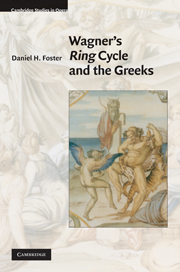Book contents
- Frontmatter
- Contents
- List of musical examples
- Preface
- Acknowledgments
- Introduction
- Part I Epic
- Part II Lyric
- Part III Drama
- 9 Introduction: what is drama?
- 10 Opera and tragedy
- 11 Opera and comedy
- 12 Resolution and ambiguity in comedy and tragedy
- Epilogue: Time, the Ring, and Performance Studies
- Appendices: Wagner's primary and secondary sources
- Notes
- Bibliography
- Index
11 - Opera and comedy
from Part III - Drama
Published online by Cambridge University Press: 07 May 2010
- Frontmatter
- Contents
- List of musical examples
- Preface
- Acknowledgments
- Introduction
- Part I Epic
- Part II Lyric
- Part III Drama
- 9 Introduction: what is drama?
- 10 Opera and tragedy
- 11 Opera and comedy
- 12 Resolution and ambiguity in comedy and tragedy
- Epilogue: Time, the Ring, and Performance Studies
- Appendices: Wagner's primary and secondary sources
- Notes
- Bibliography
- Index
Summary
Each of the first three operas in the Ring cycle – Das Rheingold, Die Walküre, and Siegfried – more or less evolves from its predecessor according to the Grecocentric paradigm of poetry outlined by Hegel in his Aesthetics and (mostly) followed by Wagner in such theoretical works as Opera and Drama, “Art and Revolution,” and “The Art-Work of the Future.” Generically speaking, these first three operas develop from earlier forms of epic (such as cosmogony, theogony, and epigraph in Das Rheingold) to more advanced forms of epic (epic proper in Die Walküre) to lyric (explorations of the self's relationship to the state and to nature in Siegfried). Given this evolutionary pattern, one would expect the Ring to culminate in Götterdämmerung by re-creating what Wagner, Hegel, and other German Romantics considered the acme of Greek art: Athenian tragedy. However, as we have already seen, in his theoretical works Wagner does not completely embrace the possibility of re-creating Greek tragedy as German music drama. Götterdämmerung further disappoints one's expectations about the rebirth of Greek tragedy by seeking to deconstruct present modes of theatrical practice rather than re-create the past as future. Looking once again at his letter to Franz Liszt on February 11, 1853, we notice that Wagner explains this apocalyptic anomaly as a kind of deus ex machina. Or, more accurately, he writes himself into the role of deus, to alter, through destruction, the expected evolutionary path of the Ring cycle: “Mark well my new poem –, ” Wagner intones, “it contains the world's beginning, and its end [Untergang]!” Reading Das Rheingold as “the world's beginning,” Götterdämmerung would, somewhat obviously, represent its cultural culmination as ruin.
- Type
- Chapter
- Information
- Wagner's Ring Cycle and the Greeks , pp. 220 - 234Publisher: Cambridge University PressPrint publication year: 2010



